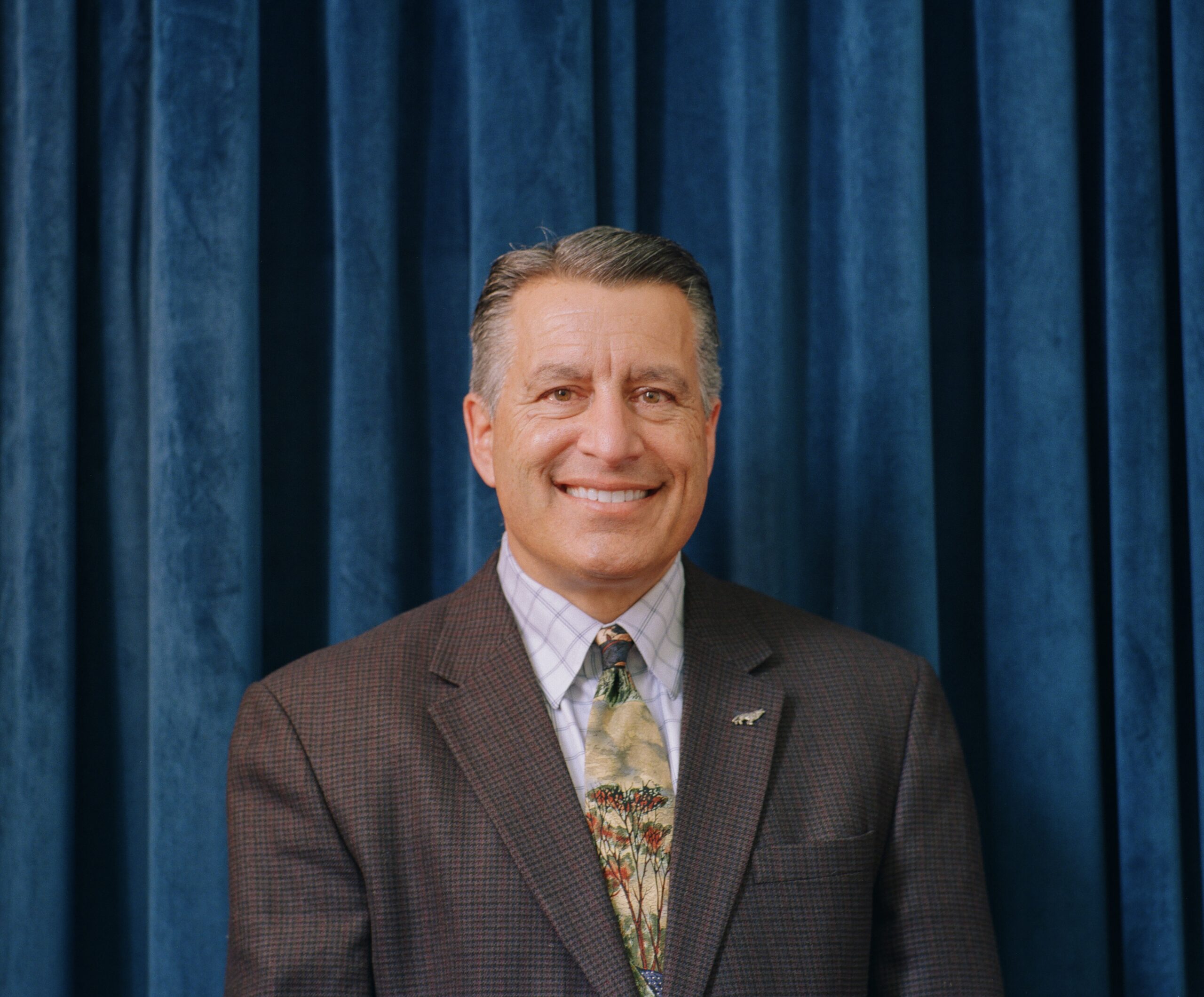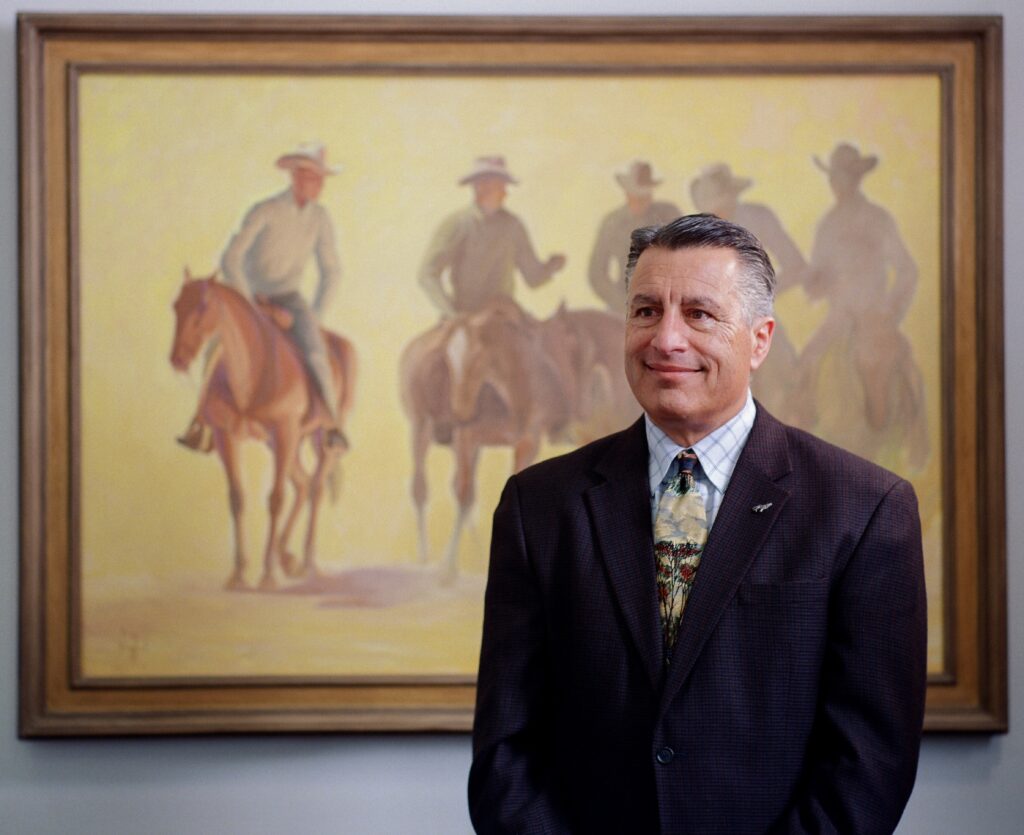
Photographed on Film by Gabe Kanae
When starting my first ever profile interview, the first words said being “diversity, equity and inclusion is a big priority of mine” was exactly what I was yearning for — yet almost immediately after sitting across from Brian Sandoval, University of Nevada, Reno’s current president and Nevada’s ex-governor, those words were delivered beautifully.
On an early morning following an intense snowy night in late February, I sat in the vestibule next to the slick wooden dutch door with a medal label shouting the words “President’s Office.” Across from these doors had to be the most beautiful bathroom I have also ever seen on campus. One that was the size of a small classroom with heighted float glass windows that allow the forecasted morning light to fill in the ambience.
After watching university administrators and executives enter and leave the office, nothing compared to the sound of the Sandoval’s Doc Martens climbing up the stairs, accompanied by a smile students know too well. Standing, face-to-face, Sandoval’s instant vulnerability and kindness was immediately apparent, along with the handshake that exclaimed power and leadership.
After walking through the doors of the office, past the structured and calm entrance hall with a small-scaled reception desk, I entered his office. Much like I had expected, the spacious design with a roof tall enough to support a strong reverb, was not only professional but also a vision of Sandoval’s personality. Filled with historical paintings, old newspaper excerpts and memories from the university’s past but also his own, it is instantly recognizable how proud Sandoval is of his endeavors.
After offering me a Pure Leaf Iced Tea, we sat in cognac accented leather office chairs with soft pillows that showcase the university’s school pride and just like that, the profile was off to the races.
“Forty-nine percent of the Freshman class this year come from diverse backgrounds, which is great. I want this campus to reflect what is in the community and what’s throughout the state” is what Sandoval added after mentioning the essentiality of diversity, equity and inclusion at the start of our conversation.
On where he would like to see the university to progress in the future, he recommends that students look into the strategic plan for the university for the next six years. It didn’t take but a moment for him to explain that “first and foremost, my top priority are students.”
Sandoval explains that he wants all students to “have the best academic, interpersonal social experience that they could possibly have at the university.”
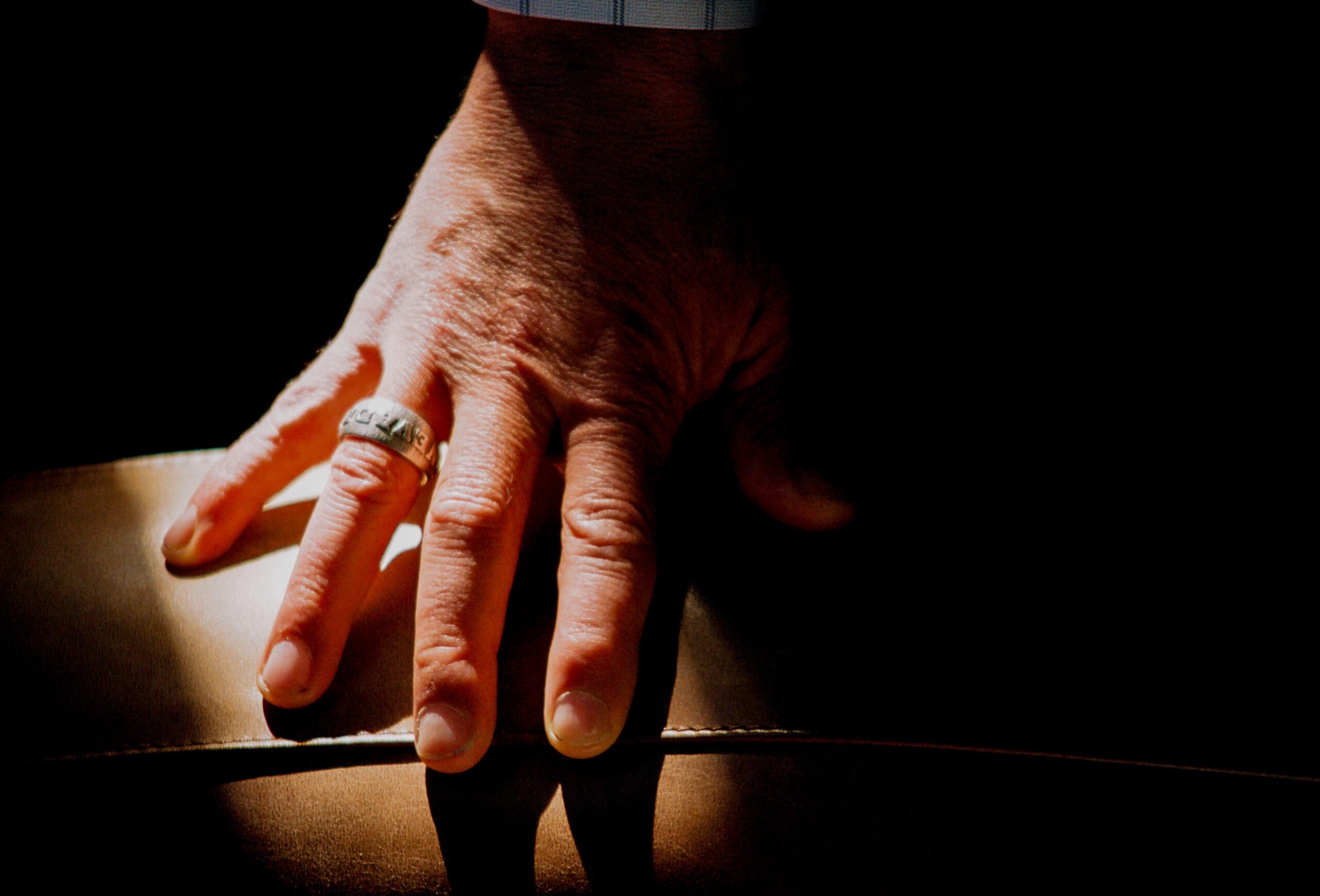
“We’re going to be celebrating our sesquicentennial next year. We want to maintain and preserve our legacy and our heritage, but at the same time, provide a modern education with the technology that is involved,” Brian says.
Photographed on Film by Gabe Kanae
To explain the intensity of his efforts on making sure these experiences are possible, he talks about the very undeniable fact that “we’ve been in a very difficult time because of the pandemic and budget cuts.” To help counteract and progress further, Sandoval divulged that just the day previously, he had been to Carson City to restore funding to allow for 42 new faculty positions. This will allow students to have more class choices and graduate on time.
“We’ve hired a lot more student advisors to get below even the recommendations of the Board of Regents for student to advisor ratios, we’re doing a lot of improvements on campus. We’re in the planning stages of building a new business building, which will be on the south end of campus.” Sandoval explains that the location of this new building will exist in the area known to students today as the Jimmy John’s, and his excitement for this new structure and opportunity is evident.
Surprisingly, he says this in a way that only inserts the guarantee that it’s true but also with the mannerisms recognized best by expressing honor.
“I really want this to be a destination university where you, or any other student can come here, get a great education and have a great experience. Just importantly, when you do graduate: to have an opportunity within the workforce to do what it is you aspire to be.” Brian added.
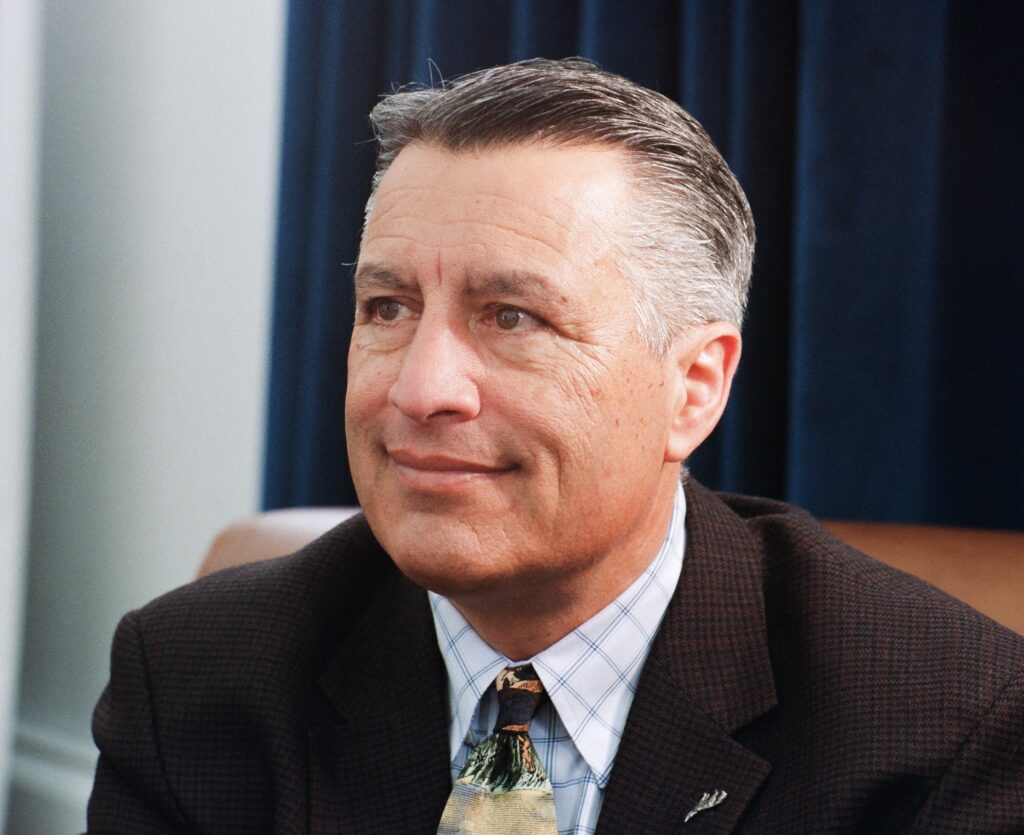
Photographed on Film by Gabe Kanae
With such an intense start to our conversation, I had to ask how he prefers students to address him. In response, he explained that “it’s never wrong” and that he enjoys spending his time interacting with students on campus when he goes on multiple walks everyday. He always does enjoy asking students how they are doing and he mentions that in return, “a lot of them do call me Brian.”
With Sandoval being such a large member of the community both in Reno but also in Nevada, it is extremely easy to forget that he’s a typical person.
He talked to me about his love for music and movies, especially the classics that he grew up with because of the connection and foundation he has with them.
I realized I had a question I needed to ask: Is Sandoval a Taylor Swift fan? His answer was an emphatic yes. “I have an 18 year old daughter who is a Taylor Swift fan. I get exposed to a lot of different music because of her.”
He also explains that he was a “child of the 70s and 80s” and when I mentioned the reliable Sony Walkman from the past, his face lit up. “Yeah! I still have some of my cassettes. No more eight tracks.”
“I like a little bit of everything. I try to watch the award winners and the nominees for the Academy Awards. Lauralyn And I will meticulously watch each one of those.”
Lauralyn McCarthy is Sandoval’s wife, whom he married in 2018. Sandoval is immensely proud of his wife and her accomplishments — herself also being an alumna of the university. She frequently is brought up in conversation and each time is accompanied with a welcoming and loving smile, despite her not even being in the room.
She makes him happy and that is a detail you cannot miss.
“I love spending time with my wife. We love to hike. We love to be outdoors,” he said.
He even mentions that they both have plans to attend an art and musical performance on campus the next day that they are both looking forward to because it “really makes me proud, I feel like you’re all my kids.”
“Everyone has all these different interests. I’m going to be a judge in a three minute thesis for some of our graduate students. I like to watch our band perform. I love to see students conduct research and change the world,” said Sandoval
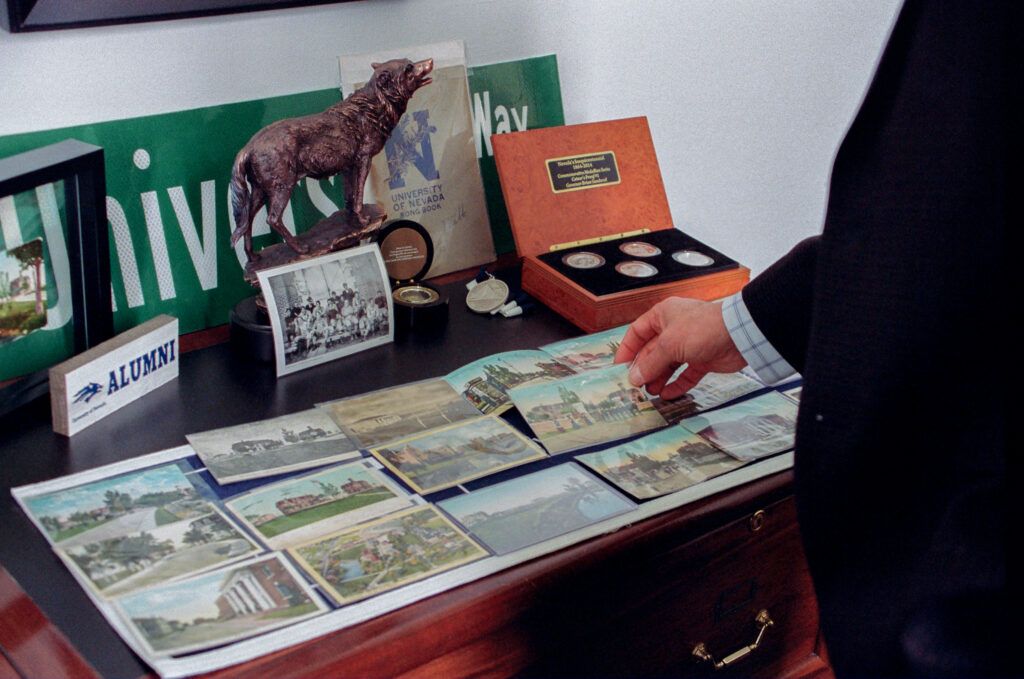
Photographed on Film by Gabe Kanae
Sandoval talked with me about growing up in the area, specifically Sparks, Nev. He attended Bishop Manogue High School before he and his brother both attended and graduated from the university. Shockingly to me, he also mentioned that while growing up in Sparks, they spent their time raising sheep by themselves and that is how the two of them paid their tuition. Today, his brother is a veterinarian.
“I love this town. I tell people I’m a son of Sparks because I grew up in Sparks, but I’ve lived in Reno my entire life, besides the three years where I went to Ohio State [University] for law school. I was born in California and my dad worked for the federal government,” Sandoval explained. “So, we moved around a lot. We first moved to Fallon, Nevada – in 1969. I spent some time there and then moved to Sparks. I’ve spent a lot of time in Las Vegas, and a lot of time in rural Nevada. For my previous jobs it was really important to get throughout Nevada and it is really just a special place.”
Hearing Sandoval talk about his youth, I began to think about the amount of learning, the amount of connections and the amount of experiences he has had. His posture is so comfortable and his voice is vulnerable. His suit and tie rested calmly in place and his arms relaxed on the arm rest.
“Northern Nevada has come a really long way. When I was growing up, it was a tourism based economy because Nevada and New Jersey were the only states with legalized gambling. As gaming proliferated, the market really narrowed, and really hurt our economy. That was one of my goals, as the governor, was to diversify our economy,” he said.
Sandoval added that the big moves to bring Tesla, Google Apple and Amazon provide a lot of opportunities for students and residents. However, he still worries about other issues like affordable housing and water challenges.
Nonetheless, he acknowledged Northern Nevada as a whole being a great place to live.
“It’s where I raised my family, my three kids and I want our students and the people in this community to have the same opportunities they did.”
Sandoval also discussed the unique and recent acquisition of the formerly known Sierra Nevada university, now called the University of Nevada, Reno at Lake Tahoe. He mentions that
“We’re going to have our first cohort of students. You’ve heard about studying abroad, we’re gonna have a semester at Tahoe,” said Sandoval excitedly. “Students from it will be multidisciplinary and that tuition will be no different at Lake Tahoe as it would be here. It’ll be a curriculum based on sustainability. We’ll have some technology mixed in.”
He then joked, with a bright and expressive smile, about maybe having classes about hiking or snowboarding to enhance the experience. It’s almost apparent that if he could, he himself would take the classes.
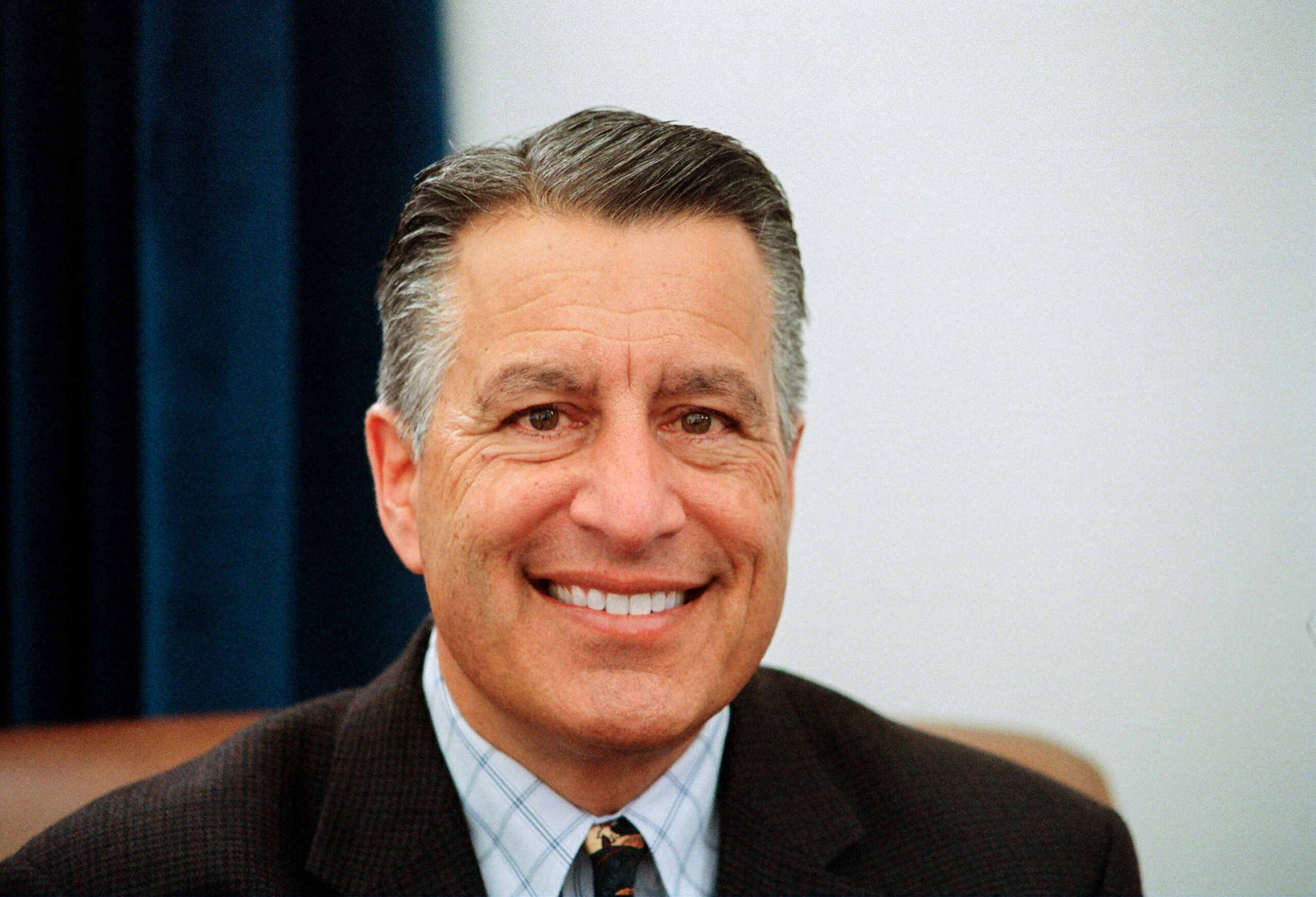
Photographed on Film by Gabe Kanae
Intriguingly, being the previous governor of Nevada, students at the university grew up watching Sandoval’s political races, discussions and actions on the television or hearing about him through their family growing up. I had to ask, how does being the governor compare in both similarities and differences to being the president?
“As governor, you’re responsible for the entire state. I think part of what makes me a better president is I am familiar with the entire state and as governor, I visited over 300 schools. Elementary schools, middle schools, high schools, and all the campuses in higher education,” said Sandoval in response. “I want the best for our students as governor. I sponsored the largest tax increase in Nevada history to infuse that money into K-12, because I want to improve the quality of education in the state. Serving as president is the opportunity to really put that into action and continue to improve education in Nevada.”
With similarities came differences but Brian addressed them with responsibility and respect.
“Natural disasters such as the horrible tragedy that occurred in Clark County, with shootings, floods etc,” he said. “As President, it’s more like being in charge of a large city, we have 20,000 students, faculty and staff.”
However he also explained why he took the position as president in the first place. The number reason being: he loves it here.
“I do believe in my heart that everything that I’ve had the opportunity to accomplish, and be involved in started on this campus,” said Sandoval. “I made my best friends in the world here. I had mentors here from faculty and staff. When I was a student here, I interned for Paul Laxalt, who was a [United States] senator.”
He explained that he is “really passionate about this university, and what it has done and what it can do.”
He mentioned that after serving his time as the governor he was the president of global gaming for MGM which meant he was traveling frequently because of MGM’s plans to potentially develop an integrated resort in Japan. It was in Japan that he was made aware of the opportunity and applied.
“I’m a non-traditional candidate. I don’t come from an academic background, I didn’t come through a faculty appointment, and then a chair of a department and perhaps a dean, and then a provost: which is the traditional pathway. I bring a different skill set: a real familiarity with higher education and how it’s budgeted,” said Sandoval on his skill set. “When I applied, that’s when we were in the teeth of the beginning of the pandemic. We also had a budget crisis. I felt like I really had demonstrated the skill set to lead this university at a time of crisis. My understanding is that over 100 people applied, it was a very in depth search process and I was very blessed and fortunate to be selected.”
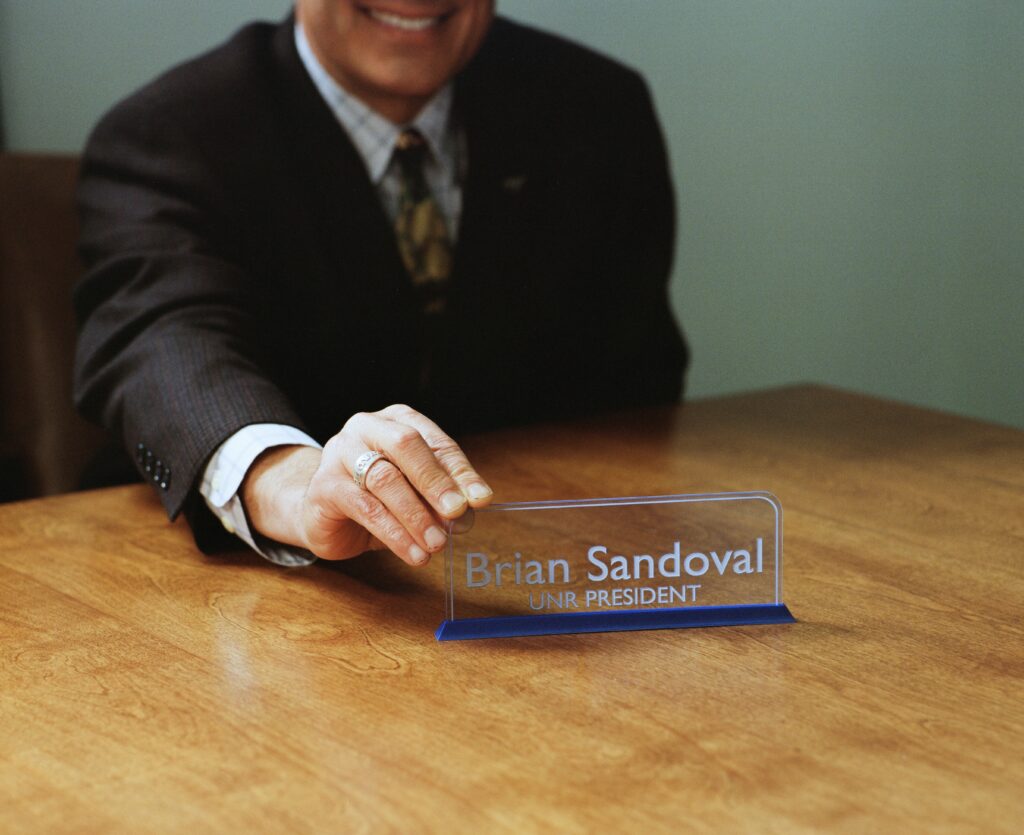
Photographed on Film by Gabe Kanae
Following Sandoval’s introduction as president of the university, the COVID-19 pandemic was unexpectedly life altering for everybody. I asked him how the pandemic changed what his vision of his first year as president would be like and how it impacted choices.
“It was hard because,” he said. “I had to watch our students, faculty and staff and all the struggles that they had to go through trying to balance the best educational experience that they could provide, but obviously, with health and safety.”
He talked about the difficulties of having to teach staff and faculty how to transition to online learning and work environments, as well as the issues with implementing social distancing in smaller lecture rooms. Not all was bad, he did discover some things in the process.
“One of the things that we discovered during the pandemic was there was no digital equity. Not every student had a device, not every student had access to WiFi,” said Sandoval. “So, we partnered with Apple. Now, every incoming or transfer student gets an Apple iPad, pencil, a keyboard and the training.”
To add more to the opportunities of the Apple collaboration, he mentions that while “I wish we could have done it for every student,” and that “we simply didn’t have the resources to do that given the budget cuts.”
He addressed the budget cuts further and explained the budget being cut by 12 percent due to the pandemic.
“We had to cut our budget by 12 percent, which was millions and millions of dollars. There was a time when everything had to be remote. So with insurance, we weren’t getting any revenue for that, but we still have to make payments,” he said in explanation. “You’re trying to balance the budget and provide a good quality experience for the students, make sure the health, safety and welfare of everyone is taken care of and you’re never going to please everybody.”
When asked about trying to return to online learning or enforcing instructors to allow opportunities for students to take more sick days and ways to catch up on lost work due to common illness, colds or other circumstances post the COVID-19 implementation, Sandoval said the following:
“I work with the provost about the student experience, but there’s also academic freedom. So the faculty has the ability to present their classes and build their syllabi. I know a lot of them, if not all of them, still account for the fact that we are endemic now. There is still COVID and other illnesses, as you have talked about it, my understanding is they do make accommodations for the students. If a student is sick, nobody wants to have somebody who’s sick in the classroom. I think that’s natural, and built into their curriculum.”
He also mentioned that the university is currently “in a search right now for a new vice provost of online learning” and “we also have to be able to reach the students who can’t make it physically on campus, Perhaps they’re working or live far away and don’t have easy accessibility here, so we are going to definitely enhance our online offerings.”
A massive topic recently among students is the protocols for how school delays and cancellations work. I was curious on how involved Sandoval is in this process and what goes into understanding when delays or cancellations are needed.
“This is an opportunity to compliment the men and women who work in facilities when we have snow days,” said Sandoval about the workers who are often forgotten. “They’re here at 3:30 to make sure that all the walkways and roads are cleared and sanded so they’re safe. They’re extraordinary and they do an incredible job.”
He explained to me that the state climatologist, Washoe County School District and even the Nevada Department of Transportation are some of the experts that influence the decisions made on early morning conference calls about the potential delays and cancellations. He also confirmed to me that he does personally participate in that decision making.
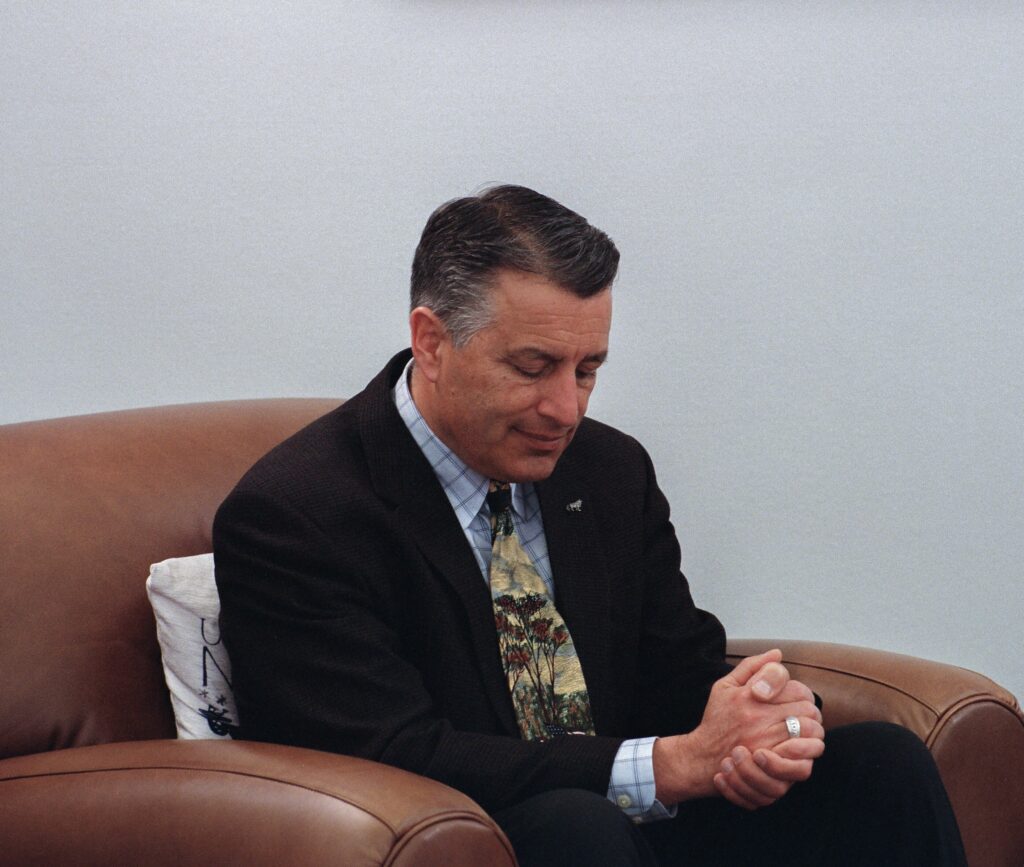
Sandoval sits in his office following the difficult choice to not rescind classes following a snowy evening.
Photographed on Film by Gabe Kanae
On the concept of providing more opportunities for students to shop for foods to cook and make themselves via a potential grocery store on campus, Sandoval said there are currently no plans.
“Certainly nutrition is incredibly important and for students that do want to prepare their own meals and have that fresh produce, fruit and vegetables, we want to make that as accessible as well,” he said. “But right now, are we looking at building a standalone facility for that? No. But are we looking to perhaps expand Pack Provisions? Yes.”
Proudly and without a second thought, Sandoval talked with me about the growing LGBTQ+ community on campus. Hearing him express importance and recognition toward a community so essential to the community was not only humanizing but encouraging.
“One of the things I’m proud of on our campus is the LGBTQ presence here. I’ve met with several of the groups and always want to be very supportive,” Sandoval said. “I want it to be interactive. If there are great ideas, and thoughts or recommendations, I want to hear those so that we can make it just as positive of an experience as possible.”
A concept on campus that students tend to forget about very frequently is the amount of staff and employees who do not teach classes or are involved face-to-face in the learning process for students. Following the pandemic and the requirement for online work, I asked Sandoval about issues regarding returning these employees back to in person workplaces in buildings such as the PBS building, Planetarium, Computing Center, Ross Hall and more.
In response, he said that “I’m glad you brought this up, because we have amazing people on this campus that really don’t get the attention that they deserve.”
Adding to this and regarding payroll in Ross Hall, he said: “First of all, I really acknowledge and thank them for what they do. There was a budget salary restoration so that all the employees had to take furloughs as part of the budget cuts, which means they took a day off but didn’t get paid either. I think it was a 6 percent pay cut. Our payroll not only does the payroll for this university, they do a roll for other campuses as well. But they worked hard before Christmas so that when the employees were able to get the rebated furloughs, they got that before Christmas and that didn’t happen on a lot of other campuses for what they do.”
It’s very unique to see Sandoval discuss an issue or topic that may not be the largest to tackle. He may not fully be involved in it and it could be low on his list of priorities, but he knows the details. He knows the people and he knows the background.
“Now that the restrictions are lifted, they have come back to campus. So, I don’t think anyone’s been displaced that I’m aware of. And we welcome them back with open arms. A lot of people on this campus are here to serve students. And in order to serve students, you have to be physically present to do that. There are some employees, for example, that work in technology that can work remotely, they don’t work face to face with students, and that works really well. There is a process in which an employee can apply to their supervisor and seek to work remotely if they want to, and that can get approved. And that’s something that the provost goes through.”
Following his time as a Republican governor, I asked Sandoval on how or if his political opinions have changed or align with the current stances today. I also asked him how working with this younger generation has opened his eyes to new ideas and views and how they impact his role and vision as the president of the university.
To start Sandoval says that he is “not politically active at all,” he explains that he doesn’t “support any candidates” and that “it’s really important in this job to be apolitical.” He was also able to recognize that his experiences in public service have been beneficial to his current position and that “relationships I’ve had from before helped me so that I’m a known entity when I testify in front of a committee or I meet with an elected official.”
He illustrates that “not all of my views are aligned with the Republican party” and that he has done “a lot of unconventional things from a Republicans perspective as governor.” As an example, he mentions how he was the first Republican governor to opt in on the Affordable Care Act, which he says “was very important.”
He also proudly mentioned how he raised over a billion dollars in taxes to fund education, something he said “is not a popular Republican thing to do.”
Of course, Sandoval reveals that he has his own personal values which he maintains, but being the president of the university has opened his eyes and exposed him to a mixture of different opinions and perspectives among his peers and higher educational topics.
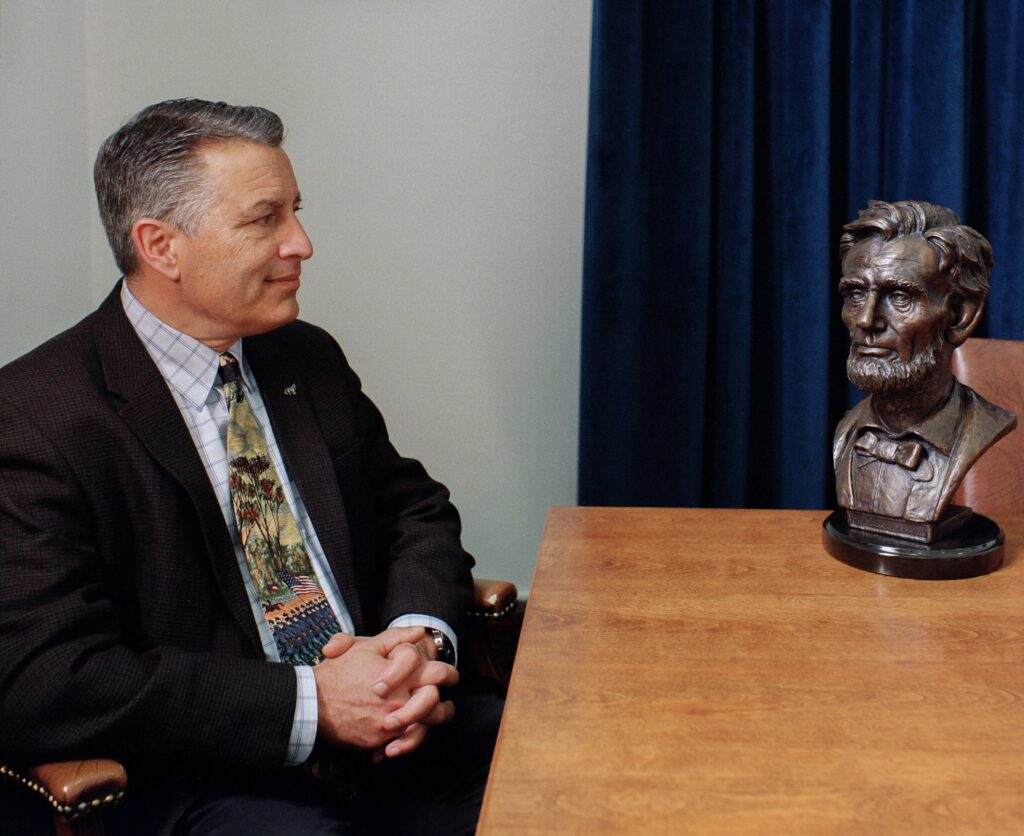
Photographed on Film by Gabe Kanae
He explains that his past experiences of being a federal judge, attorney general and the chairman of the Nevada Gaming Commission also allowed him to approach this job by being able to be objective and listen to the facts.
“I’ve been really blessed to be exposed to a lot of different ideas which have informed my next job,” said Sandoval.
Regarding his social media usage, Sandoval mentioned that while he does have Facebook and Twitter, marketing communication helps him use them so that he can connect with students easier and consistently because he recognizes the importance of these platforms in students’ day lives.
Within the topic of social media platforms, I asked Sandoval for his opinions on the anonymous social media platform YikYak, which is used as a way for users within a location vicinity to discuss and post short text sentences. The app is used by college students to discuss events and rumors.
“I have zero tolerance for hate speech and I think we should all be supportive of one another,” said Sandoval immediately. “We all come from different backgrounds and we should be respectful of backgrounds and values.”
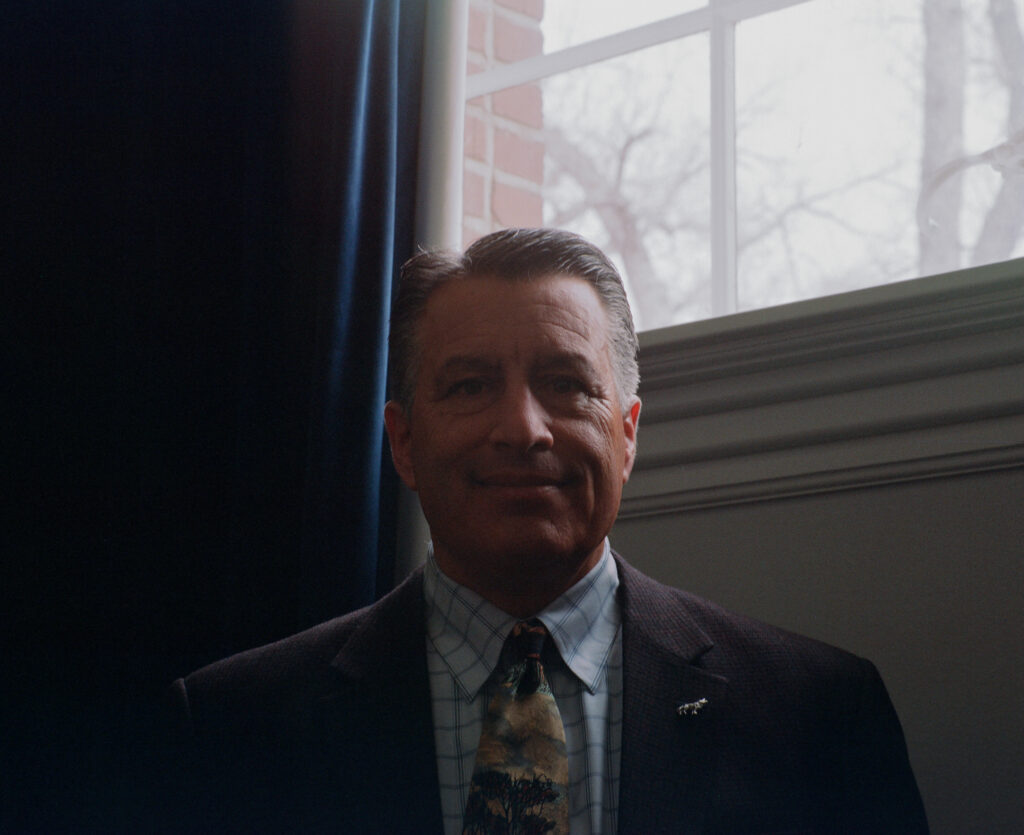
Photographed on Film by Gabe Kanae
Sandoval was quick to point out and promise that the necessary and effective methods of trying to prevent bullying both online and on campus are growing. Including the hiring of a new director for diversity, equity and inclusion.
“Part of that job responsibility is to go around campus, have training and have speakers to really show all students that we should be inclusive,” said Sandoval about the position.
Sandoval and his eye for diversity has allowed him to feel empathy for people in communities he does not belong to. Working with these people has been one of the highlights of his time in the public eye and as president.
“It’s something I think about. I want everyone to feel safe. And we’ve had these horrible shootings across this country like what just happened in Michigan State [University]. Immediately upon learning about that, I checked in with Student Services,” said Sandoval regarding the MSU shooting in February where three students were killed “I checked in with our police department to make sure that we’re doing the training across campus that everything is secure on campus, particularly the residence halls, and that everyone is aware of what they should do in a situation like that.”
It’s a topic that is easy to forget and neglect. Having such a substantial and significant influence on the university both in terms of academic performance and policy development, his overall safety on campus is essential.
“Believe me, I understand through a career of public service, not everyone’s gonna agree with me, not everyone’s gonna like me. I respect that,” said Sandoval. “But no, the answer is no, I don’t feel threatened. I don’t have a reason to feel threatened that I know of. But, I’m really concerned about everyone else and I want to make sure that they feel safe.”
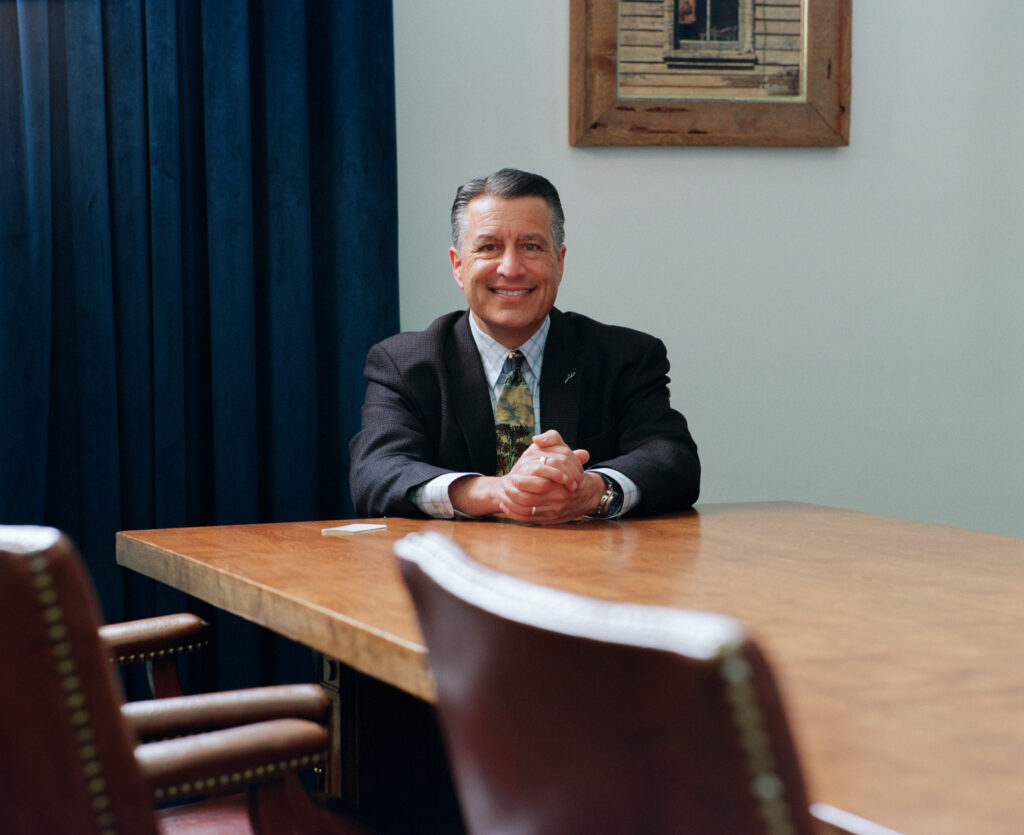
Photographed on Film by Gabe Kanae
The last question I asked Sandoval focuses on the fact that it is easy for students to forget he is a normal person just like they are. I asked if he could hope the students around him had one specific mindset toward him, what would it be?
“Just to come up and say ‘hello!’ I want to learn about all of our students, where they and their families are from, what they want to do in life and what kind of career they’re studying.”
While speaking with him, his experiences and discussions with students on campus coming from a mixed variety of different backgrounds and cultures was consistently discussed. Knowing he not only hears these experiences, but analyzes, learns and grows from them was absolutely incredible to hear.
Nonetheless, when I talk to people who in a societal context could be seen as higher or more indispensable, I always find it important to tear that wall down and expose the reality that they are a normal person.
“You’re right, I’m no different than anyone else. I grew up raising sheep! I’ve been very blessed in my life to be involved in public service,” said Sandoval. “This job, to me, is another element of that.”
With a kind and slight nod, his generous heart and attitude reflected and glistened in the tone he worded the following statement:
“I’ll finish where I started, and that is that I want students to have the best experience they can possibly have. It’s not meant to be easy in terms of academics, you need to be challenged. I think that makes us all stronger. I was challenged when I was a student here and as you go through your life and have your successes and your challenges that you can learn about, look back at your experience here and lean on that. Go forward.”
With an exchange of thank yous, Sandoval stood up and showed me around his office. Explaining the history behind it, even showing photos of the room in the past as a library.
He showed the historical pieces of art, memories and objects that make up his office and inspire him everyday. He explained the background and stories of how he got his desk and when in his life he got it. His love and appreciation to not only his past, but the universities expressed the gratitude and appreciation he truly has to work here.
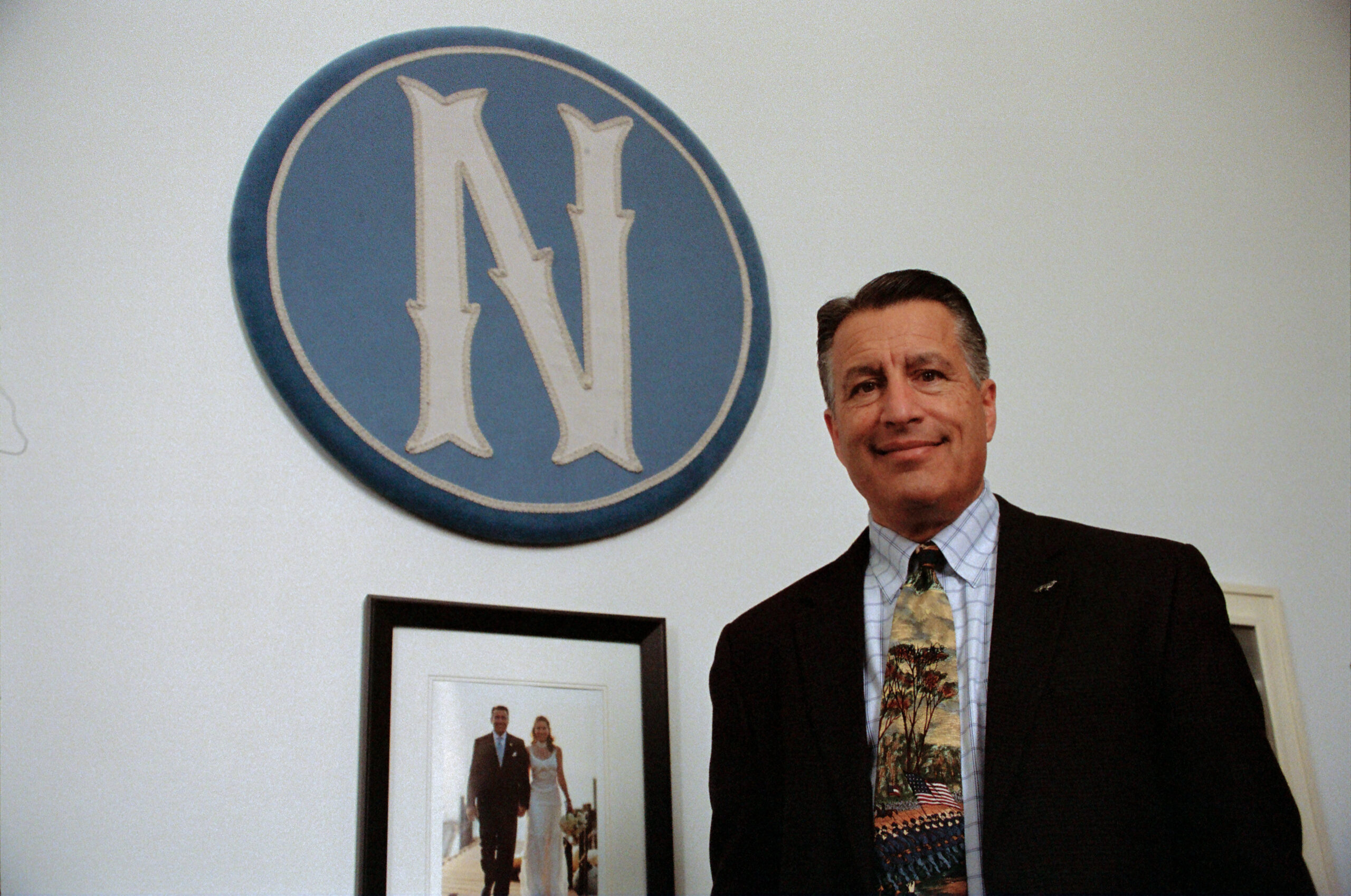
Photographed on Film by Gabe Kanae
Sandoval has done so much in his life. He has gone through experiences that not only create a leader, but grow one. With the amount of time, dedication and love he puts towards the campus and students, it has never been more apparent that Sandoval’s love for what he does is unconditional. Showcasing football helmets from the teams past, to photo cards filled with images of the historical grounds not only he walks on, but we do as well, Sandoval is not only the president the university needs, but the one for students to adore.
Gabe Kanae can be reached via email at gkanae@sagebrush.unr.edu or via Twitter @NevadaSagebrush.
